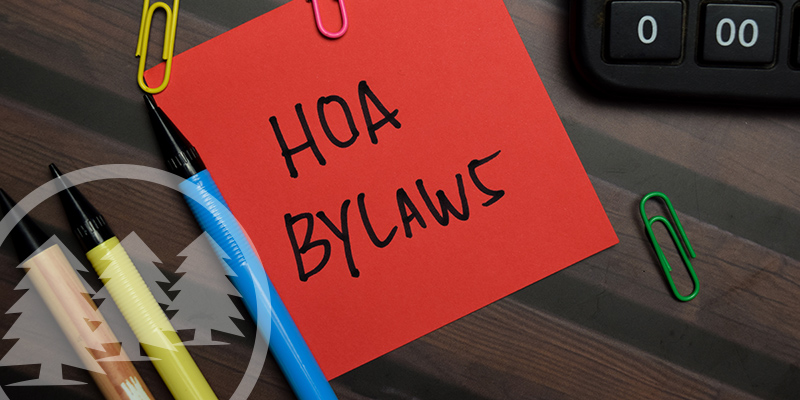Can an HOA amend bylaws and covenants? Now and then, the need will arise. Board members act as the leaders of the association. However, they don’t possess absolute power that would allow them to change the bylaws and covenants without going through the proper channels and procedures. Improperly enacted amendments are usually unenforceable.
How Can HOA Amend Bylaws and Covenants? Understand Them First
Every homeowners association maintains a set of governing documents that dictate the operation and management of the community as well as the responsibilities and obligations of the HOA and homeowners. Two of the most important documents are the bylaws and the Declaration of Covenants, Conditions, and Restrictions (CC&Rs), otherwise known as the covenants.
An HOA’s bylaws dictate how the association operates. The bylaws consist of the requirements and procedures for running the association. It typically includes directions for board elections, how and when meetings should be held, and voting rights, among other things.
In contrast, the CC&Rs or covenants dictate the rules of the association. They consist of property use limitations, homeowner obligations, and more. One of the most common provisions within the CC&Rs is the obligation of members to pay dues. The objective of the CC&Rs is to preserve and improve the property values in the neighborhood.
Over time, some provisions in the bylaws and CC&Rs may become outdated. State laws may change, making them inconsistent with current bylaws and covenants. Sometimes, an association simply wants to change the provisions. However, making an amendment is not as easy as erasing a line and replacing it with a new one.
While provisions can vary from one HOA to another, here are the most common provisions one may find within their bylaws and covenants:
1. Architectural Standards
The bylaws and covenants may detail the association’s guidelines when it comes to renovating homes, adding improvements, modifying exteriors, and changing or adding landscaping.
2. Maintenance Obligations
The bylaws and covenants may establish the obligations of both the HOA and the homeowners when it comes to maintenance and upkeep. Typically, the HOA is responsible for maintaining and repairing the common areas, while homeowners are responsible for their individual properties or units.
3. Homeowner Dues
The bylaws and covenants establish the obligation to pay dues, including the frequency and method of collections as well as what they cover.
4. Common Area Use
The bylaws and covenants define the rules concerning common areas and amenities, such as swimming pools, clubhouses, and fitness centers.
5. Property Use
The bylaws and covenants may specify how homeowners may use their properties or units, such as prohibiting rentals or commercial businesses.
6. Dispute Resolution
The bylaws and covenants also typically govern how an HOA should resolve disputes within the community, whether between the HOA and a homeowner or between two neighbors.
7. Board Elections
The bylaws and covenants should also include the qualifications for candidates running for positions on the board, the process for electing board members, and the roles these board members play.
8. Voting Rights and Procedures
The bylaws and covenants establish the voting rights of each member, including vote allocations per household. Additionally, these documents should detail how the HOA makes decisions through votes.
How to Change Homeowners Association Bylaws
Homeowners associations wishing to amend their bylaws have two considerations: state laws and the HOA. Some states may have existing laws that apply to associations concerning amendments to the bylaws. More often than not, though, state law dictates that the method to change the bylaws should be contained within them.
This brings us to the second consideration. You will generally find the rules for changing bylaws outlined in the same place — the bylaws. Because bylaws can vary from one association to another, the requirements for amendments are not always the same. Typically, though, an HOA will need to secure the membership vote.
If the bylaws are silent, an association may be able to turn to the state’s corporation law. For instance, in California, Corporations Code Section 7150 can provide guidance.
How Can an HOA Amend Covenants?
As with bylaws, an association may amend its covenants according to state law and the provisions within the CC&Rs. The CC&Rs should set forth the requirements and procedures for amending HOA covenants. Typically, amending the CC&Rs would require at least 67 percent of votes from the membership. Again, state laws can differ on this issue, so it is best to check yours before proceeding.
Amending HOA Bylaws and Covenants: Step-by-Step Process
If your HOA board wants to change the bylaws or covenants, it is best to adopt a formal process. This will standardize the amendment procedure and avoid improperly enacted changes.
Can an HOA amend bylaws? The simple answer is yes. Here is how to amend association bylaws and covenants.
1. Review the Current Documents
The first thing you should do is take a look at the current bylaws and covenants. This will help you determine what you wish to change. For example, a careful review could unearth a long-obsolete or outdated provision that requires updating.
2. Propose the Amendment
If you want to amend bylaws, the second step is to propose the amendment. The proposal should clearly describe the amendments to the covenant or bylaw.
 3. Meet to Discuss the Amendment
3. Meet to Discuss the Amendment
After making or receiving the proposal, the HOA board will meet to discuss the amendment. This board meeting should be open to all homeowners so they can provide their input. Changing HOA bylaws and covenants may need a special meeting if there is no regularly scheduled board meeting coming up.
4. Notify Homeowners
If the board decides to approve the amendment, it will then need to go to the homeowners for a vote. A majority vote from the membership is usually required for amendments to the covenants. That said, this may need a separate meeting — one that necessitates proper and adequate notice.
5. Take a Vote
After the discussion and review, the association will vote to pass or reject the amendment. Depending on state laws and the governing documents, this will likely require a vote from the entire membership. Keep in mind that some states have specific requirements when taking a vote to amend bylaws and CC&Rs. For example, California law requires the use of secret ballots.
Make sure to take note of the following:
- Whether you need a majority vote or a unanimous vote to pass an amendment;
- If notice is required before a vote; and,
- Whether or not you can vote electronically.
6. Count the Votes
After taking a vote, the board must count the votes at an open meeting. This way, homeowners can attend the meeting and witness the counting. Transparency is important when amending bylaws and covenants as it establishes trust between the board and the homeowners.
7. Approve or Reject the Amendment
The vote tally should reveal whether or not the membership has approved the amendment. Again, associations may have differing requirements to approve an amendment. Make sure to review your state laws and governing documents.
8. Record and Notify Homeowners of the Change
For changes to the CC&Rs, an association will likely need to record the amendment with the county recorder’s office. Bylaws usually don’t require recording. For both types of amendments, though, it is important to give notice of the change to the membership.
Challenges When HOA Amend Bylaws
More often than not, changing the bylaws and covenants will go smoothly. However, it is not unheard of for an HOA to encounter some hurdles when amending its documents. These challenges include the following:
- Homeowner Pushback. Homeowners may disagree with the proposed amendments, especially when it comes to controversial topics such as rental restrictions. This can lead to conflict among members.
- Voter Turnout. Amendments require a vote to pass, but an HOA may have trouble securing enough votes or even a quorum to begin with.
- Opposing Views. Homeowners and board members will naturally have conflicting perspectives on amendments. Many boards find it difficult to balance everyone’s opinions, but the most important thing is to put the association’s best interests first.
- Legal Requirements. An HOA should adhere to state laws and its governing documents when amending bylaws and covenants. As such, it is best to seek help from a lawyer or HOA management company.
Can HOA Change Rules Without a Vote?
Most state laws and governing documents require a vote to amend the bylaws and covenants of an association. However, for changes to the operating rules, the HOA board does not typically need to secure a vote from the membership. Enacting or changing a rule usually only requires a vote of approval from the board itself. Though, it is still worth checking the governing documents to see if rule changes also have special requirements.
Can HOA Change Rules Without Notice?
 Changing the bylaws or covenants usually requires a vote from the membership. As such, the board should provide proper notice of the change and the board meeting where the discussion/voting will occur. Bear in mind that notice requirements can vary as well.
Changing the bylaws or covenants usually requires a vote from the membership. As such, the board should provide proper notice of the change and the board meeting where the discussion/voting will occur. Bear in mind that notice requirements can vary as well.
On the other hand, changes to the operating rules usually don’t require a vote from the membership. That said, the HOA board should still give proper notice of the board meeting where the board will discuss and vote on the rule change. Additionally, if the rule change passes, the board should notify homeowners of the change.
HOA Amend Bylaws: How to Write an Amendment to Bylaws
When amending your bylaws, it is important to use the rest of the document as a guide. Use similar language in your amendment to make for a cohesive read-through. It is also best to keep a copy of the original bylaws without the amendment. This way, you have something to compare the new bylaws to.
An amendment to the bylaws should include the proposed change and the reason for the change. More often than not, your amendment will include some legalese. To avoid confusion, it is a good idea to write a summary that uses plain language for residents to read. In doing so, you can prevent any misunderstandings or misinterpretations.
Writing amendments is no easy feat. You must consider the entire document as well as other provisions that may conflict with the change. If your board does not have experience in this aspect, it is recommended to seek help from a lawyer.
HOA Amend Bylaws: Important Tips
Here are the most crucial tips when amending your HOA’s bylaws:
- Review your state laws and governing documents. This ensures that your amendment won’t conflict with any existing provisions. Additionally, this will help you amend your bylaws according to the proper procedures.
- If you have a bylaw committee, make sure their values are aligned with the association’s. It is also a good idea to aim for a diverse group of people when assembling your bylaw committee. This way, you can get different perspectives.
- Check the rules of your association before amending your bylaws. Find out how many votes you need to approve the change, whether or not notice is necessary prior to a vote, whether or not a meeting is required, and whether or not electronic voting is permitted.
- Never copy another association’s bylaws or amendments. This is because their bylaws may not suit your association well. Furthermore, their bylaws may not be in line with your state laws.
HOA Amend Bylaws: Frequently Asked Questions
How to change bylaws for a nonprofit?
To amend a nonprofit’s bylaws, follow these steps: propose the amendment, set a meeting to discuss the change, vote on the amendment, count the votes, and, if approved, record the amendment with the government.
How to change bylaws to a nonprofit organization?
The process for changing bylaws for nonprofit organization depends on two things: state laws and your governing documents. Some states may have specific requirements and procedures on how to change or amend bylaws. Additionally, your bylaws themselves may contain the rules for amendments. Make sure to review these two things before you change your bylaws.
How to amend bylaws for non profit?
Amending your bylaws will require you to review your state laws and existing governing documents. From there, you can draft your amendment. After drafting your amendment, you must discuss the change with the membership. Typically, this will take place at a scheduled meeting.
After the discussion, you can call for a vote to approve or reject the amendment. The parameters for approval will usually depend on your bylaws as well. If the membership approves the amendment, you will likely need to record the change with your county recorder’s office or other governing body.
How often should you amend bylaws?
Generally, you should amend your bylaws if there is a need for it. However, it is a good idea to review your bylaws every 2 to 3 years and see if they require a refresh. It is best not to go beyond 5 years without a review of your governing documents. This is because a lot can happen in a span of 5 years, and your bylaws may become outdated.
HOA Amend Bylaws the Proper Way
Can the HOA amend bylaws and covenants? Yes, and, as you can see, there is a right way to do it. Failing to abide by the correct procedure as per state laws and your governing documents will render any amendments null and void. Worse yet, the HOA and its board may be in legal trouble. When in doubt, hiring a lawyer is always a good idea. After all, an association will likely need a lawyer to draft the amendment anyway.
Cedar Management Group provides exceptional HOA management services to community associations. We also offer legal assistance. Call us today at (877) 252-3327 or contact us online to request a proposal!
RELATED ARTICLES:
- What Are The HOA Governing Documents You Need As A Homeowner?
- Proposed Bill Would Limit Declaration Amendments In HOAs
- 13 Common Challenges And Issues Of HOA Board Members






